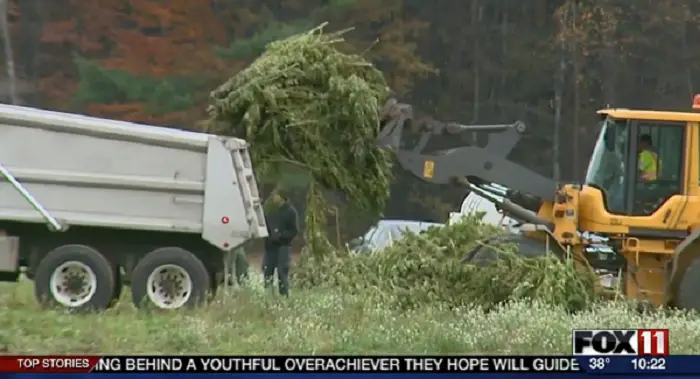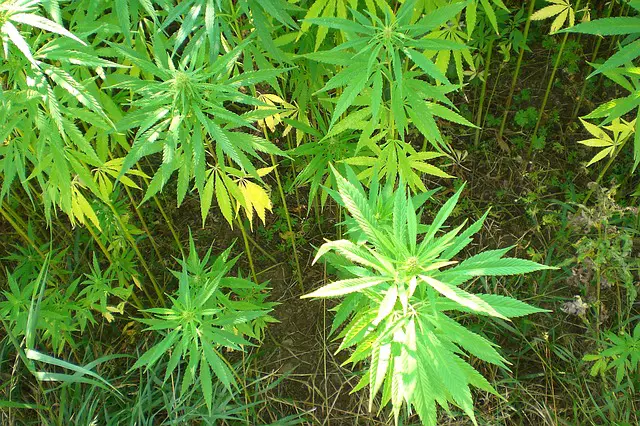
On Friday, October 24, the Drug Enforcement Administration (DEA) and FBI agents, state and country authorities, undercover agents and policemen, some wearing military gear, raided and destroyed industrial hemp crops – 30,000 plants total – grown by the Menominee Indian Tribe of Wisconsin, according to Fox 11 News in Wisconsin.
The tribe legalized growing low THC (tetrahydrocannabinol) industrial hemp on its land in May this year, reported CBS News. The hemp crops were supposed to be protected by the Farm Bill according to the tribe’s press release. But now the feds are saying that the plants were actually a type of high grade marijuana according to the Fox 11 report, which said that the initial test was negative but the second test came back positive. Menominee Tribal Chairman Gary Besaw is now denying the allegations, saying that he and the tribe are “perplexed” by the raid and said they have informed the government every step of the way.
Besaw earlier stated that the crops had great economic potential for Menominee Tribe, which is currently at the bottom of the state of Wisconsin when it comes to poverty and health.
Industrial hemp can be used to create many products: from health foods and body care products, to biofuels and plastic composites. And the North American Industrial Hemp Council (NAIHC) states that hemp can be used to create more than 25,000 different products.
“The actions by the federal government here are very troubling. The issue here is not the more controversial one of recreational marijuana…We are talking about industrial hemp and a crop that was legalized by the Menominee Indian Tribe of Wisconsin, was being grown on Tribal lands for research purposes under an agreement with College of the Menominee Nation and was always intended to be a legal crop under the 2014 Farm Bill,” said Tim Purdon, a lawyer for the Menominee Indian Tribe of Wisconsin and former chair of then-attorney general Eric Holder’s Native American Issues Subcommittee.
Watch NBC 26 news coverage — Besaw speaks out:
Farm Bill: Sec. 7606 – Industrial Hemp Research
Section 7606 of the Farm Bill made it legal for an institution of higher education or a State department of agriculture to grow industrial hemp for purposes of research. Industrial hemp was defined as “the plant Cannabis sativa L. and any part of such plant, whether growing or not, with a delta-9 tetrahydrocannabinol concentration of not more than 0.3 percent on a dry weight basis.”
The Menominee tribe reported that they planted hemp in agreement with the College of the Menominee Nation, which is defined as an institution of higher education.
Tribe Says They Complied with Officials
According to the tribe’s news, they have complied to the best of their knowledge with all the laws and offered to work with the law officials to find a resolution in case they had done something incorrectly. Industrial cultivation of hemp was legalized by the Tribal Law and the United States Attorney Office for the Eastern District of Wisconsin was notified of this change in the law. The cultivation should comply with the Farm Bill as it was planted as a project under an institution of higher education. The crops were planted on tribal lands, and Besaw stated that “the State of Wisconsin has no jurisdiction over Tribal activities on these lands.”
 The tribe’s press release says that they were transparent about this project since the beginning through the U.S. Attorney’s Office and the government had full knowledge of it. It was reported that they had multiple in-person meetings with former U.S. Attorney Jim Santelle and current U.S. Attorney Greg Haanstad about growing industrial hemp. The tribe invited the Federal Law Enforcement to come and test the crops throughout the process.
The tribe’s press release says that they were transparent about this project since the beginning through the U.S. Attorney’s Office and the government had full knowledge of it. It was reported that they had multiple in-person meetings with former U.S. Attorney Jim Santelle and current U.S. Attorney Greg Haanstad about growing industrial hemp. The tribe invited the Federal Law Enforcement to come and test the crops throughout the process.
Besaw’s office stated that they had a disagreement with Haanstad about parts of the project and offered to find a solution including destroying parts of the crops themselves if they tested above the allowed THC limit and to file a Declaratory Judgment Action in United States District Court for the Eastern District of Wisconsin, so that the judge would make a decision about this disagreement. But the tribe’s proposals to work out the issue were rejected.
Besaw stated after the raid: “I am deeply disappointed that Obama administration has made the decision to utilize the full force of the DEA to raid our Tribe. We were attempting to grow industrial hemp for research purposes in accordance with the farm bill. We offered to take any differences in the interpretation of the farm bill to federal court. Instead, the Obama administration sent agents to destroy our crop while allowing recreational marijuana in Colorado. I just wish the President would explain to tribes why we can’t grow industrial hemp like states, and even more importantly, why we don’t deserve an opportunity to make our argument to a federal judge rather than having our community raided by the DEA?”
The tribe stated that after the raid they have no other choice but to “move forward with litigation to settle the question of its ability to grow industrial hemp under the 2014 Farm Bill.”
Legality of Industrial Hemp
According to Vote Hemp, a non-profit committed to the acceptance of industrial hemp:
“To date, thirty-two states have introduced pro-hemp legislation and twenty have passed pro-hemp legislation. Ten states (California, Colorado, Kentucky, Maine, Montana, North Dakota, Oregon, Vermont, Washington and West Virginia) have passed industrial hemp farming laws and removed barriers to its production. These states will be able to take immediate advantage of the industrial hemp research and pilot program provision, Section 7606, of the Farm Bill. Three states (Hawaii, Kentucky and Maryland) have passed bills creating commissions or authorizing research. Nine states (California, Colorado, Illinois, Montana, New Hampshire, New Mexico, North Dakota, Vermont and Virginia) have passed resolutions. Finally, eight states (Arkansas, Illinois, Maine, Minnesota, New Mexico, North Carolina, North Dakota and Vermont) have passed study bills. However, despite state authorization to grow hemp, farmers in those states still risk raids by federal agents, prison time, and property and civil asset forfeiture if they plant the crop, due to the failure of federal policy to distinguish non-drug oilseed and fiber varieties of Cannabis (i.e., industrial hemp) from psychoactive drug varieties (i.e., “marihuana”).”
The current legislation status for each state can be read here.
Thanks for installing the Bottom of every post plugin by Corey Salzano. Contact me if you need custom WordPress plugins or website design.




